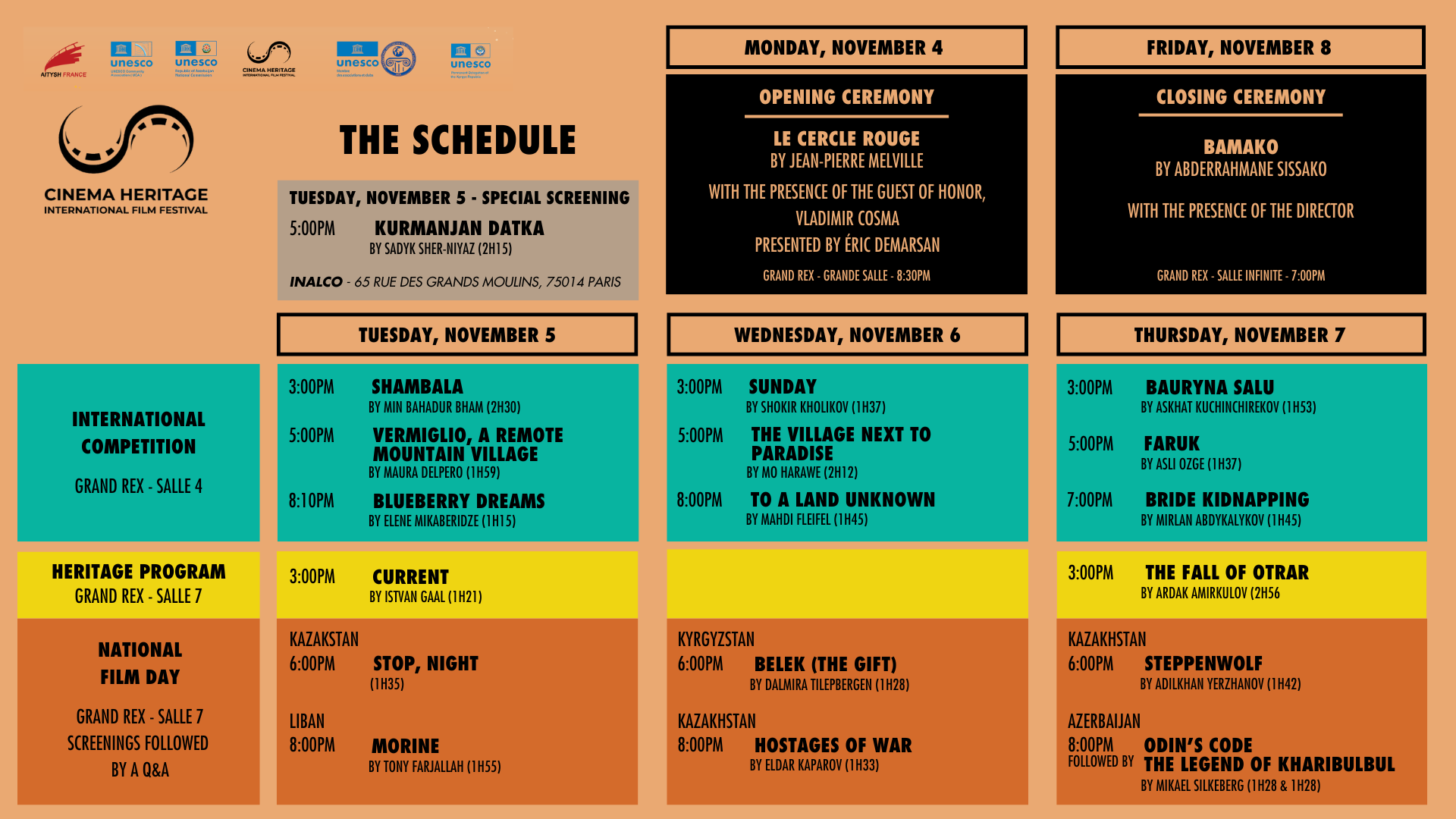"Cinema Heritage" International Film Festival : Discover the jury and the schedule!
DISCOVER THE FESTIVAL'S SCHEDULE

Jury
Eric Demarsan
With a career spanning 50 years, Eric Demarsan's most recent credits include the Netflix series NOTRE-DAME, LA PART DU FEU, directed by Hervé Hadmar, with whom he works closely: LES OUBLIÉES (2007), PIGALLE LA NUIT (2009), SIGNATURE (2011), ROMANCE (2020), and the series co-directed with Marc Herpoux: LES TÉMOINS (2014-2017) and AU-DELÀ DES MURS (2016).
He has composed music for some of the greatest classics of French film noir, including Jean-Pierre Melville's L'ARMÉE DES OMBRES (1969) and LE CERCLE ROUGE (1970). In 2020, he composed the original music for the Arte documentary MELVILLE, LE DERNIER SAMOURAÏ, a tribute to the director.
‘With its unique melodic sense, perverse harmonies and breathtaking orchestrations, Eric Demarsan's music astonishes and surprises, and deserves to be appreciated for the full extent of its originality’. (Stéphane Lerouge)
In 2000, these landmark scores brought him into contact with the film-maker Guillaume Nicloux, for whom he composed : UNE AFFAIRE PRIVÉE, CETTE FEMMELÀ, LE CONCILE DE PIERRE, THE END and the TV drama L'AFFAIRE GORDJI, HISTOIRE D'UNE COHABITATION.
He has also starred in 7 films by Jean-Pierre Mocky, including L'IBIS ROUGE, as well as a number of directors: Christian Gion with C'EST DUR POUR TOUT LE MONDE, Costa-Gavras with SECTION SPÉCIALE, Pierre Zucca with ROBERTE and Patrice Leconte with LES SPÉCIALISTES. He has also appeared on television in Pierre Granier-Deferre's LA DERNIÈRE FÊTE and Jacques Deray's CLARISSA.
Eric Demarsan first came to the attention of the audiovisual world (cinema d'auteur and television) in the 1970s, thanks in particular to his work as an orchestrator with renowned film music composers such as Michel Magne (from 1965 to 1967) and François de Roubaix. Working alongside them, he learned his trade on Bernard Borderie's ANGÉLIQUE series, André Hunebelle's FANTÔMAS, François Villiers' LES CHEVALIERS DU CIEL, Jean-Pierre Melville's LE SAMOURAÏ and Julien Duvivier's DIABOLIQUEMENT VÔTRE.
Siddiq Barmak
Siddiq Barmak was born in Panjshir, Afghanistan in 1962. He earned an MA in cinema from VGIK in Moscow in 1987.
His debut feature, "Osama" (2003), received accolades at numerous prestigious festivals such as Cannes, Busan, and London. It was also named the Best Foreign-Language Film at the Golden Globe Awards in 2004. Barmak's second movie, "Opium War" (2008), achieved recognition as the best film at international film festivals in Rome, Batumi, Pristina, Kish and various other film festivals.
In addition to his filmmaking endeavors, Barmak played a pivotal role in publishing the first film magazine in Afghanistan “Cinema” and contributed to the field by teaching cinema at Kabul University.
He is a member of the Academy of Motion Picture Arts and Sciences as well as Netpac.
Currently based in France, Siddiq Barmak is immersed in the production of his upcoming film, "The Postman."
Gela Babluani
French screenwriter, producer and director of Georgian origin. Born in 1979 in Tbilisi, Georgia. Emigrated to France at the age of 17. His first feature film, the film 13 (2005), won awards at the Venice Film Festival, the Sundance Film Festival and the European Film Academy.
FILMOGRAPHY
2018 ‘SECT’, TELEVISION SERIES, 8 EPISODES, GUDSTORIMEDIA
2017 ‘MONEY’, FEATURE FILM, ELECTRICK FILMS (FRANCE)
2010 ‘ 13 ’, FEATURE FILM, OVERNIGHT FILMS, MORABITO PICTURE COMPANY, BARBARIAN FILMS (USA)
2006 ‘ INHERITANCE ’, FEATURE FILM, LES FILMS DE LA STRADA, QUASAR PICTURES, PREMIUM FILMS, SOLIMANE PRODUCTIONS (FRANCE/GEORGIA)
2005 ‘THIRTEEN’, FEATURE FILM, LES FILMS DE LA STRADA, QUASAR PICTURES, SOLIMANE PRODUCTIONS, MK2 PRODUCTIONS (FRANCE)
AWARDS
2017 - Grand Prix and Best Director Award at the Brussels International Film Festival - Film ‘Money’.
2007 - Special Jury Prize at the Sundance International Film Festival (USA) - Film ‘Inheritance’.
2007 - Nominated for a César for Best First Film - Film ‘13’.
2006 - European Film Academy Award in the ‘European Discovery Of The Year’ category. - Film ‘Thirteen
2006 - Fipresci Prize at the Transylvania International Film Festival (Romania) for ‘Thirteen’.
2006 - Grand Jury Prize at the Sundance Film Festival (USA) - Film ‘ Thirteen ’.
2005 - Director's Award at the Tbilisi International Film Festival (Georgia) - Film ‘Thirteen’.
2005 - Luigi De Laurentiis Award for Best First Film and Netpac Prize at the Venice International Film Festival (Italy) - Film ‘Thirteen’.
Dinara Drukarova
She made her film debut at the age of ten, in C'était au bord de la mer. It was in Vitali Kanevski's Bouge pas, meurs, ressuscite that she got her first particularly noticeable role, the film winning the Caméra d'or in 1990 at the Cannes Festival. She then reunited with the Russian director and took part in the filming of Une vie indépendante and the documentary Nous, les enfants du XXe siècle.
In 1998, she starred in Des monstres et des hommes by the young Russian director Alekseï Balabanov. At the same time as filming, she was studying humanities at St Petersburg University. The end of the 90s was marked by upheaval in her country. The economic and political situation led her to decide to leave Russia and move to France. She began by learning French to play in Le fils de Gascogne, alongside actresses of Russian descent such as Macha Méril and Marina Vlady.
In 2003, she starred in Julie Bertuccelli's film Depuis qu'Otar est parti, a story about three generations of women in Georgia, for which she won the Prix Michel-Simon and was nominated for a César for Best New Actress in 2004.
In the years that followed, she continued her acting career. She has had the chance to work with major directors such as Michael Haneke, Arnaud Desplechin, Pascal Bonitzer, Léa Fehner, and Eric Rochant in the series Le Bureau des légendes from season 4, where she plays an FSB agent.
For her, acting is a way of existing, a way of moving forward in life. It allows her to understand, to explore emotions, to live stories through her characters and to tell those stories as accurately as possible.
At the age of 30, she lost her mother, and the violence of that loss devastated her. She was looking for a way to overcome this ordeal, and it was at this point that she conceived the idea of making a short film about bereavement. Ma branche toute fine (2018), her short film, helps her to mourn and move on.
Grand Marin (2021), her feature film, is just as vital for her. She feels the need to tell this story, to live it, to prove to herself that she can do it, while defending a cinema that is dear to her heart.
Laurent Dailland
Having graduated from The French National Film school, LOUIS LUMIERE, Laurent Dailland started out at the ‘Agence Française d’image’.
His first experiences as Directorof Photography of feature films were Douce Violence by Olivier Jacquot(1983) and 36 Fillettes by Catherine Breillat (1987).
In the 90’s, whilst continuing to light commercials and short films, he was offered more and more important films.
In 1997, with Place Vendôme by Nicole Garcia, he received his first nomination for a César (French film awards).
Amongst other films, he was Director of Photography on le Goût des Autres by Agnès Jaoui, Astérix et Obélix : Mission Cléopâtre by Alain Chabat, Est-Ouest, Man to Man by Régis Wargnier, Welcome by Philippe Lioret, Le Concert by Radu Mihaileanu…



